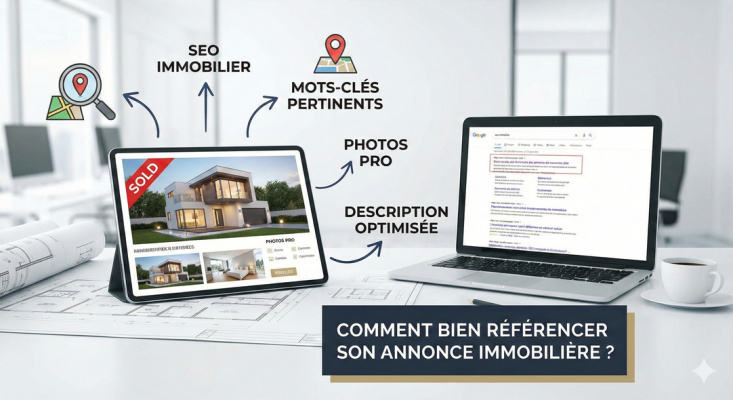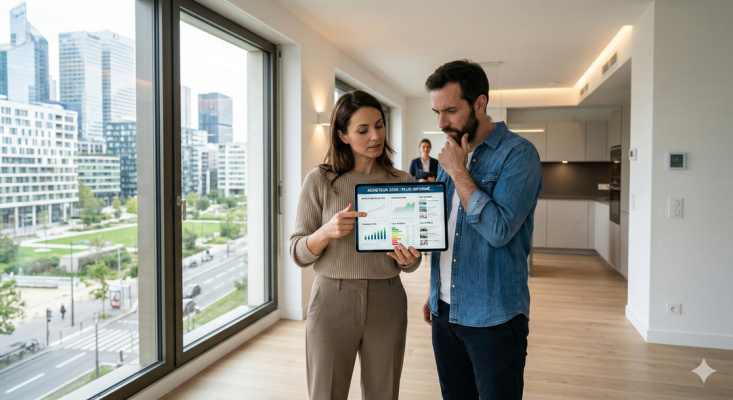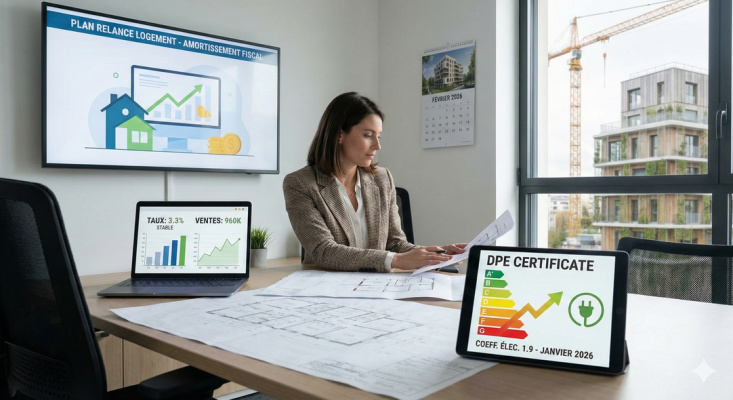How to SEO-Optimize Your Real Estate Listing

The numbers speak for themselves: more than 95% of real estate searches now start online. Whether on major portals like SeLoger, LeBonCoin or Bien'ici, or directly on Google, your future clients look for you on the web first. A well-optimized listing mechanically generates more views, which then turn into qualified leads and ultimately signed contracts. Conversely, a poorly optimized listing stays in the shadows, even if the property it presents is exceptional. SEO is not a luxury it’s a commercial necessity.
The title of your listing is the first point of contact with both your prospects and the portals’ algorithms.
It determines whether your property will appear in search results. To maximize its impact, always include precise geographic keywords and relevant property characteristics. An effective title looks like: “3-Bedroom Apartment with Balcony – Saint-Jacques District, Bordeaux” or “4-Bedroom Single-Family Home with Garden – Villeurbanne Center Area.” These formulations allow algorithms to immediately understand what you're offering and where. Avoid vague titles such as “Great Opportunity,” “Act Fast,” or “Guaranteed Favorite.” Although these expressions may sound appealing, they contain no keywords your prospects actually search for. They seriously harm your SEO and waste your readers’ time, who often abandon their search before even opening the listing.
The description is the heart of your SEO strategy.
This is where algorithms gather the information needed to rank your listing. Start by structuring your text logically: a hook sentence, the property’s main features, the neighborhood overview, then the practical information. This organization improves readability and strengthens your ranking. Enrich your vocabulary with real-estate terminology and local geographic references. Mention neighborhood specifics (“near Metro Line 1,” “quiet residential area,” “5 minutes from elementary schools”), technical characteristics (“double-pane windows,” “individual gas heating,” “solid wood flooring”) and comfort features (“equipped kitchen,” “walk-in closet,” “storage cellar”). These details match the search queries your prospects type into search engines. Never forget the practical information: HOA fees, recent or upcoming renovations, energy diagnostics, proximity to transportation and services. These elements reassure your prospects and reduce repetitive questions. Finally, take great care with spelling and grammar mistakes hurt your SEO and damage your professional image.
The quality of your photos directly influences your click-through rate, which indirectly improves your SEO.
Portal algorithms favor listings that generate engagement. Prioritize high-definition photos taken with optimal natural light. Avoid blurry, dark, or distorted wide-angle shots that give a misleading impression of the space. Organize your visuals according to a logical visit sequence: exterior or entrance first, then living room, kitchen, bedrooms, bathroom, and finally outdoor spaces or views. This narrative progression keeps visitors’ attention and increases the time spent on your listing. If you publish listings on your agency’s website, be sure to name your image files descriptively: “3-bedroom-apartment-saint-jacques-bordeaux-livingroom.jpg” instead of “IMG_1234.jpg.” This technical detail contributes to your site’s Google SEO and improves content indexing.
Each real-estate platform has its own algorithm and specific features.
SeLoger rewards complete listings with all fields filled in, LeBonCoin prioritizes freshness and responsiveness to messages, while Bien’ici focuses on precise geolocation. Adapt your strategy to each platform instead of copy-pasting the same listing everywhere. Carefully fill in all available fields — exact square footage, floor level, year built, heating type, number of parking spaces, etc. This information allows your listing to appear in the search filters used by 80% of visitors. An incomplete listing is invisible to most prospects who refine their search by criteria. Slightly vary your titles and descriptions between platforms to avoid duplicate content while keeping your main keywords. This strategy maximizes your visibility without harming your SEO.
If you want to increase your Google's visibility
If you publish your listings through your agency’s website, Google SEO becomes an additional lead-generation lever. Optimize your URLs by including the property type, city, and neighborhood: “/for-sale/3-bedroom-apartment-bordeaux-saint-jacques.” This clear structure makes indexing easier for search engines. Work on your meta tags (title and description) by integrating your geographic and property-type keywords. Create unique content for every listing, even if the properties are similar. Google penalizes duplicate content and rewards originality. Make sure your Google Business Profile is fully completed and up-to-date, with direct links to your listings. This boosts your local SEO and helps geolocated prospects discover your properties.
Several common mistakes unintentionally undermine your SEO efforts.
Copy-pasting listings from one property to another is the most widespread error even for similar properties, always write original content. Algorithms detect duplication and penalize the affected listings. Descriptions that are too short (under 100 words) don’t provide enough information for search engines to understand your offer. Conversely, long, dense blocks of text discourage reading. Aim for 150 to 250 well-structured words. Titles that are too generic (“Apartment for Sale”) or too sales-oriented (“Exceptional Opportunity”) significantly hurt your visibility. Always favor factual precision over empty marketing formulas. Finally, neglecting practical details (fees, renovations, inspections) generates repetitive questions and can drive serious prospects away. A complete and honest listing attracts more qualified contacts and increases the likelihood of confirmed visits.





